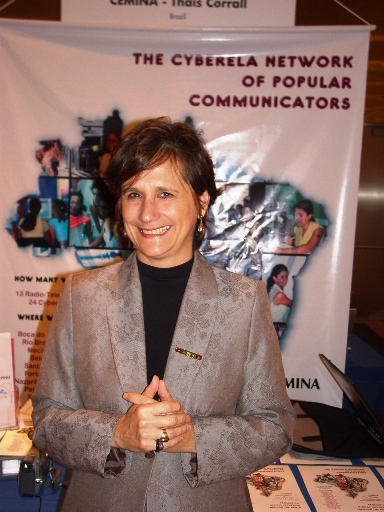 |
| Thais Corral, founder of CEMINA |
CEMINA is a non-profit organization based in Brazil that strives to serve the community of poor Brazilian women by developing methods for improving access to communication.
Currently, only 15% of the Brazilian population has access to computers and to the Internet. There is a clear inequality of access to information and communication, particularly because of the gap between the rich and the poor in their ability to access the vast network of electronic communication technologies. In turn, this also limits the ability of the poor to achieve their fullest potential in this modern age of technology.
CEMINA is working on joining small radio stations broadcasting to local communities with telecenters where residents can gain Internet and telephone access. CEMINA’s radio-ICT project integrates radio, a low-tech communication technology, and ICTs.
Telecenters set up by CEMINA "broadcast and produce radio programs" where women serve as broadcasters. The project aims to generate more discussion amongst disadvantaged women, living both on the outskirts of urban cities and in rural areas, on the issues that can improve their quality of life and affect them as women, and empower them to extend these benefits to the communities in which they live.
 |
Please tell us a little more about your project...
This project started 15 years ago with the idea that radio could be used as a vehicle to empower women's voices and their ability to be agents of change in their communities. Over the years we first started with a pilot; this pilot became a model, and we could translate this model through hundreds of training [sessions] which would eventually create this network of over 400 women's radio programs that are spread all over Brazil. In the last 5 years, the emergence of digital technology, especially the Internet, and all the software have made radio production much easier and more interesting.
 |
How was this new technology implemented into your network?
We selected what we called the "cyberelas," that is, the "cinderellas of the cyber," which are women communicators that are integrating these technologies in their radio activities.
We do it in two ways: We created this Internet website called "Radio Fala Mulher" which means "Women Speak Up" in Portuguese, and in this network we make available all these women's radio programs that can be downloaded for free. We facilitate the sharing of content amongst these radio networks. The other way in which we have been integrating technology and enhancing women's ability to use technology is through connecting the radios in certain communities, in underserved communities, through community telecenters. These community telecenters are accessible to the community for training, for income generation activities, for access to the Internet. These are the true sorts of applications that we have been doing -- using the power, the assets, that our radio community network has. So we are connecting a high technology to a low technology ... and "hi touch" which the radio promotes, which are conversations, person-to-person, with high technology that enhances access to information all over the world.
What is the type of communication that is being put forth by women broadcasters in Brazil? What are these women telling the world?
The first thing -- which was our goal -- is to enhance women's confidence to talk about their personal lives, to tell their own stories, to tell their own pains, and because if you don't build the confidence, it's very difficult for them to get to a stage of public involvement and community involvement. There are many stories, but most of the cases are health issues, quality of life issues, and [things] close to the women's lives. They tell stories of things that they feel are not right and would like changed. And we try to connect them to the people on the other end that are willing to provide these goods that they need.
What is your primary age demographic?
Normally they are women that range from their late 20s to their 60s and 70s. But the benefits of the project also reach young women, especially our ... radio Internet project, [which] is attracting a lot of young women that are starting to volunteer to help this project develop.
Do you have any heroes of your own?
I have 400 heroes. These are the radio communicators and all the women that connect to these radios. I would say that I have 6 million heroes. These are women that are engaged in daily activities that improve millions of people's lives.
Page created on 7/4/2013 12:35:50 PM
Last edited 1/9/2017 6:28:30 PM
